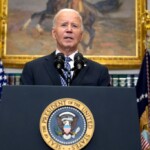
New polling from the Tar Heel State indicates the GOP presidential nominee may not be sunk by a gubernatorial candidate’s personal problems.
The East Carolina University survey of 1,005 likely North Carolina voters, conducted Sept. 23 through 26, suggests many are exploring splitting their tickets between the presidential race and the one for the state’s top job.
While Donald Trump leads Kamala Harris 49% to 47% (a lead well inside the +/- 3.3% margin of error), there is no mystery about the gubernatorial race between Republican Lt. Gov. Mark Robinson and Democratic Attorney General Josh Stein.

Stein leads the scandal-plagued Robinson 50% to 33%, in polling conducted before the LG injured himself leaning onto a hot car at a campaign appearance but after reporting showed he once referred to himself as a “black Nazi” — among a farrago of numerous other heinous assertions, including enthusiasm for chattel slavery and “tranny on girl porn.”
Robinson is in free fall with the GOP base, down to 63% support in this survey among Republicans, a 20-point decline from his intra-party standing in August’s edition.
Robinson has just 27% support among female voters, and he’s not much better with his own gender at this point, taking just 40% of men.
The erosion spans demographics. The Republican is at 42% with white voters and a miasmic 6% with blacks. He has just 30% of independents.
To put those numbers in perspective, Trump leads Harris 47% to 44% with indy voters.

And Trump is at 56% with men, 44% with women and 66% with white voters.
The former president is only at 7% with black voters, though, showing gains seen among that demographic in other states’ surveys aren’t necessarily replicating in North Carolina.
“The recent scandals surrounding Mark Robinson have had a major impact. What was once a competitive race in the election for governor of North Carolina no longer is. As of now, Josh Stein is the clear and overwhelming favorite to be the next governor of North Carolina,” said Peter Francia, director of the ECU Center for Survey Research, contextualizing the results.


